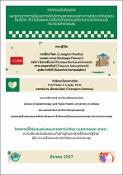บทคัดย่อ
ที่มา : การเพิ่มขึ้นอย่างรวดเร็วของจำนวนผู้ป่วยโรคโควิด-19 (Covid-19 Surged) และจำนวนผู้ป่วยวิกฤติที่เพิ่มขึ้นตามมาจากสถานการณ์ระบาดใหญ่ (Pandemic) ของโรคติดเชื้อไวรัสโคโรนา 2019 (โรคโควิด-19) ส่งผลกระทบต่อภาพรวมของค่าใช้จ่ายสุขภาพ (Healthcare Expenditures) การศึกษาผลกระทบทางการเงิน (Financial Impact) และการจัดบริการสุขภาพ (Health Services) ในช่วงสถานการณ์ระบาดใหญ่ของโรคโควิด-19 แยกรายกองทุนประกันสุขภาพ ทั้ง 3 กองทุน เพื่อเป็นข้อมูลสำคัญให้กับผู้กำหนดนโยบายสุขภาพได้นำไปประกอบการพิจารณาการบริหารจัดการทางการเงิน (Hospital Financing) และการจัดบริการสุขภาพของโรงพยาบาลให้เกิดประสิทธิภาพ ซึ่งจะเป็นประโยชน์ต่อทั้งโรงพยาบาลและช่วยลดความเหลื่อมล้ำในการเข้าถึงบริการสุขภาพของประชาชนลงได้ ระเบียบวิธีวิจัย : งานวิจัยนี้ ประกอบด้วย (1) การศึกษาผลกระทบทางการเงินและปริมาณการรับบริการเฉลี่ยต่อเดือนที่แผนกผู้ป่วยนอก (Out Patient Department, OPD) แผนกผู้ป่วยใน (Inpatient Department, IPD) แผนกห้องฉุกเฉิน (Emergency Department, ED) และแผนกห้องผ่าตัด (Operation Room, OR) แยกตามกองทุนประกันสุขภาพ ทั้ง 3 กองทุน ในช่วงสถานการณ์การระบาดใหญ่ของโรคโควิด-19 เทียบกับสถานการณ์ปกติ และ (2) การศึกษาแนวคิดและการดำเนินนโยบายของโรงพยาบาลในการสร้างศักยภาพสำรองในการจัดบริการสุขภาพ (Reserve Health Services Capacity) ในด้านการดูแลผู้ป่วย ด้านระบบบริการ ด้านการจัดการสถานที่ ด้านการจัดการบุคลากร ด้านการจัดการเครื่องมือแพทย์ ยา เวชภัณฑ์และวัสดุทางการแพทย์ และด้านอื่นๆ ในพื้นที่โรงพยาบาล จำนวน 8 แห่ง ครอบคลุมในทุกระดับของสถานบริการในสังกัดสำนักงานปลัดกระทรวงสาธารณสุข และจำแนกตามโซนสีพื้นที่ที่มีการระบาดของโรคโควิด-19 กระจายใน 4 ภูมิภาคทั่วประเทศไทย ผลการศึกษา : เมื่อเปรียบเทียบใน 3 ช่วงเวลา ดังนี้ ช่วงที่ (1) สถานการณ์ปกติ (ก่อนเกิดการแพร่ระบาดของโรคโควิด-19) ระยะเวลา 2 ปี ระหว่างวันที่ 1 ม.ค. พ.ศ. 2561 ถึง 31 ธ.ค. พ.ศ. 2562 ช่วงที่ (2) สถานการณ์ระบาดของโรคโควิด-19 ระยะเวลา 15 เดือน ระหว่างวันที่ 1 ม.ค. พ.ศ. 2563 ถึง 31 มี.ค. พ.ศ. 2564 และช่วงที่ (3) สถานการณ์ระบาดใหญ่ของโรคโควิด-19 ระยะเวลา 6 เดือน ระหว่างวันที่ 1 เม.ย. พ.ศ. 2564 ถึง 30 ก.ย. พ.ศ. 2564 พบแนวโน้มอย่างชัดเจนว่าโรงพยาบาลรายได้พึงได้รับต่อเดือนที่เป็นผลรวมของราคาตามอัตราค่าบริการของโรงพยาบาลจากผู้ป่วยไม่เป็นโรคโควิด-19 ลดลงเมื่อเทียบกับรายได้พึงได้รับต่อเดือนก่อนช่วงเกิดการระบาดและมีความสัมพันธ์กับระดับความรุนแรงของสถานการณ์การระบาดของโรคโควิด-19 อย่างไรก็ตาม ความเสี่ยงทางการเงินวิกฤติ 7 ระดับ (Risk Scoring) ของโรงพยาบาล ในช่วงที่ (2) ไม่แตกต่างจากช่วงที่ (1) ในขณะที่มีค่าลดลงในช่วงที่ (3) อาจเนื่องมาจากการปรับอัตราการเบิกจ่ายค่ารักษาผู้ป่วยโรคโควิด-19 ของกองทุนประกันสุขภาพ ทั้ง 3 กองทุนมีค่าเพิ่มขึ้น ประกอบกับการบริจาคเงินและ/หรือวัสดุอุปกรณ์ทางการแพทย์แก่โรงพยาบาลด้วย การที่ความเสี่ยงทางการเงินของโรงพยาบาลไม่มีปัญหาหรือดีขึ้น ทั้งที่อัตราการใช้บริการและรายได้พึงได้รับจากการจัดบริการให้แก่ผู้ป่วยที่ไม่เป็นโรคโควิด-19 ลดลงอย่างชัดเจน เป็นเพราะการได้รับการชดเชยค่าบริการผู้ป่วยโรคโควิด-19 เพิ่มขึ้นมาก โดยเฉพาะระยะที่ 3 ทั้งการจ่ายเพิ่มเติม (Add-On) เป็นรายการทั้งบริการในสถานพยาบาลและบริการที่บ้าน ในส่วนของปริมาณใช้บริการที่แผนกต่างๆ ในโรงพยาบาลมีการเปลี่ยนแปลงไป เมื่อเปรียบเทียบใน 3 ช่วงเวลาดังกล่าว ในภาพรวมพบว่า แม้ว่าปริมาณผู้ป่วยโรคโควิด-19 ยังมีไม่มาก แต่โรงพยาบาลจำเป็นต้องมีการเปลี่ยนแปลงรูปแบบการจัดบริการ รวมถึงการขาดองค์ความรู้ ส่งผลให้ปริมาณผู้ป่วยที่ไม่ใช่โรคโควิด-19 ในโรงพยาบาลในช่วงที่ (2) ลดลง สำหรับในช่วงที่ (3) ซึ่งเป็นสถานการณ์ระบาดใหญ่ ปริมาณผู้ป่วยโรคโควิด-19 เพิ่มสูงขึ้นอย่างมาก ในขณะที่ปริมาณผู้ป่วยที่ไม่ใช่โรคโควิด-19 ก็กลับมามีปริมาณเท่าๆ กัน กับช่วงที่ (1) คือ สถานการณ์ปกติ การเปลี่ยนแปลงดังกล่าวนี้จะเห็นได้ชัดในแผนกผู้ป่วยนอกและแผนกห้องฉุกเฉิน ส่วนปริมาณการรับบริการที่แผนกผู้ป่วยในและแผนกห้องผ่าตัดนั้นไม่มีการเปลี่ยนแปลงอย่างชัดเจน เนื่องมาจากโรงพยาบาลมีความพยายามในการรักษาศักยภาพการจัดบริการใน 2 แผนกนี้ อย่างไรก็ตามการจัดบริการที่แผนกห้องผ่าตัดนั้นจะเน้นเตรียมไว้สำหรับการผ่าตัดฉุกเฉิน (Emergency Surgery) สรุป : สถานการณ์ระบาดใหญ่ของโรคโควิด-19 ส่งผลกระทบต่อการรับบริการด้านสุขภาพ โรงพยาบาลในฐานะผู้จัดบริการสุขภาพมีความจำเป็นต้องจัดสรรทรัพยากรที่มีอยู่อย่างจำกัด เพื่อคงศักยภาพในการจัดบริการสุขภาพที่จำเป็นและมีความเร่งด่วน ควรสร้างกลไกถาวรในการประกาศสถานการณ์ฉุกเฉินสำหรับโรคอุบัติใหม่ การปรับปรุงกลไกการจ่ายเงินชดเชย การปรับกรุงอัตราการเรียกเก็บค่ารักษาพยาบาลและปรับปรุงระบบสารสนเทศ เพื่อให้สามารถกำกับติดตามสถานการณ์การเงินการคลังอย่างสม่ำเสมอ การวางแผนเตรียมความพร้อมและแผนประคองกิจการเป็นปัจจัยสำคัญที่จะช่วยเตรียมความพร้อมของสถานพยาบาล เพื่อรับมือกับการระบาดของโรคติดต่ออุบัติใหม่ในอนาคต
บทคัดย่อ
Background: The rapid increase in the number of the patients infected by the Coronavirus disease 2019 (COVID-19 surged) and the number of critically ill patients following the pandemic situation has an impact on the overall health care expenditures. This study examines the financial impact and health services impact during the COVID-19 pandemic. The findings from this study are important information for health policy decision makers in considering financial management to ensure efficiency of providing health services at hospitals that will be beneficial the entire hospital and reduce inequality in people's access to health services. Methods: This study consists of (1) studying the financial impact and the average monthly service volume at the Outpatient Department (OPD), Inpatient Department (IPD), Emergency Department: ED) and Operating Room department (OR) separated by the 3 health insurance schemes during situation of the COVID-19 pandemic compared to normal situation. And (2) studying the concept and implementation of hospital policies to create reserve health services capacity in terms of patient care, health service system, places, personnel, drugs and medical equipment, and others in 8 hospitals that covers all levels of service facilities under the Office of the Permanent Secretary Ministry of Public Health and classified according to color zones, areas where the COVID-19 outbreak is spread in 4 regions across Thailand. Results The results were compared in 3 periods as follows: period (1) normal situation (Before the COVID-19 outbreak) for a period of 2 years, between 1 January 2018 and 31 December 2019, period (2) COVID-19 outbreak situation, for a period of 15 months, between 1 January 2020 to 31 March 2021, and period (3) during the COVID-19 pandemic situation for a period of 6 months, between 1 April to 30 September 2021. The trend of the revenue hospitals should receive per month which is the sum of the hospital service rates from patients without COVID-19, was clearly decreasing compared to monthly income before the outbreak and is related to the severity of the COVID-19 pandemic situation. However, the hospital's 7 levels of critical financial risk (Risk Scoring) during period (2) were not different from period (1) while it was decreasing during period (3). This may be due to adjustments in reimbursement rates for treatment of COVID-19 patients of all 3 health insurance funds have increased in value including donating money and/or medical equipment to the hospital. That the hospital's financial risks are no problem or have improved despite the service utilization rate and the income that should be received from providing services to patients who do not have COVID-19 disease clearly decreased because the hospitals were receiving compensation for COVID-19 patients' services has greatly increased including additional payments (add-ons) for both services in medical facilities and services at home especially during period (3). In terms of the utilization of health care services in the hospitals, there had been a change. When comparing the 3 periods mentioned above, they were found that although the number of COVID-19 patients had been still small, hospitals needed to change their service delivery model according to the lack of knowledge of COVID-19. As a result, the number of non-COVID-19 patients in hospitals during period (2) decreased. For during period (3), which was a large outbreak situation, the quantity of COVID-19 patients greatly increased while the number of non-COVID-19 patients returned to the same amount as during period (1) which was a normal situation. This change was evident in outpatient and emergency room departments. As for the volume of services received at the inpatient department and operating room department, there was no obvious change. This may be because the hospital had made the effort to maintain the potential of providing services in these two departments. However, the services in the operating room department would focus on preparing for emergency surgery (emergency surgery). Conclusion: The situation of COVID-19 pandemic affecting the health services utilization rate. Hospitals, as providers of health services, need to allocate limited resources to maintain their capacity to provide essential and urgent health services. A permanent mechanism for declaring states of emergency for emerging diseases should be established. The compensation mechanism, the medical treatment claim rates and the information system are needed to be improved for monitoring the financial situation regularly. Including preparedness planning and business sustainment plans are important factors that will help prepare healthcare facilities to deal with outbreaks of emerging infectious diseases in the future. Preparedness planning and business sustainment plans are important factors that will help prepare healthcare facilities to deal with outbreaks of emerging infectious diseases in the future.


